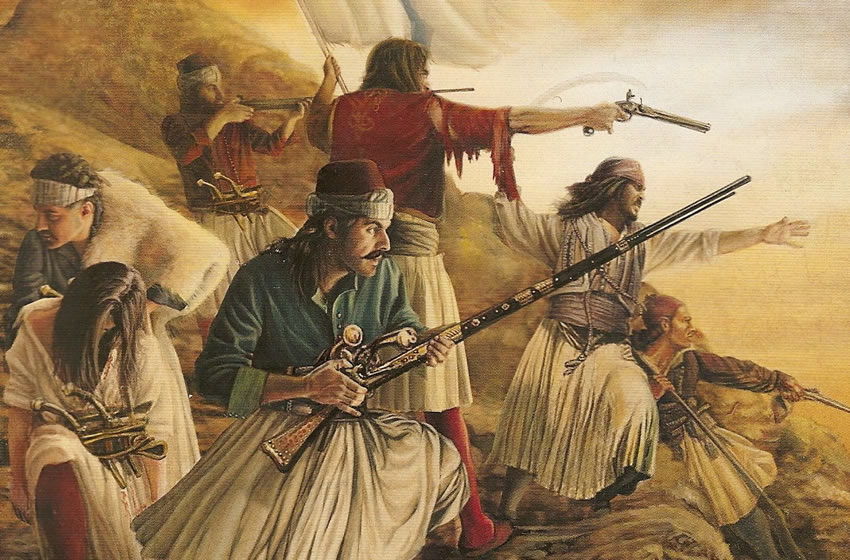“Traveler passing by, come let us meet in this sacred place that flows with glory and inspires heroism!”
Odysseas Androutsos (1790-1825)
He was born in 1790 in Ithaca. His father was Andreas Verousis from Livanates in Lokris.
The heroic sortie of the Greeks
The heroic deed of the Greek fighters at the famed Inn of Gravia revived the spirit of the revolutionaries of Roumeli.

The Fortress of Freedom
When a few decided to stand against thousands and won.
On May 8, 1821, in a small brick-built structure in Gravia, Fokida, the legendary Inn of Gravia, the Greek revolutionaries led by Odysseas Androutsos wrote pages of heroism and glory, achieving their first meaningful victory against the Turkish forces.
In late April 1821, the disastrous outcome of the Battle of Alamana, accompanied by the martyrdom of Athanasios Diakos, had dampened the morale of the revolutionaries and had paved the way for the Turco-Albanian general Omer Vryonis and the Turkish general Kiose Mehmet.
When courage was fortified and History bowed reverently before him.
120 Greeks against 8,000 enemies. An inn was turned into a fortress, and fear changed camps.
Indeed, on May 7, 1821, the forces of Omer Vryonis — 7,000–8,000 infantrymen and one thousand cavalry — were at Thermopylae and were heading toward Gravia. At the same time, there was divergence of opinion among the Greek captains as to the point where the Greek forces should resist.
Androutsos ultimately decided to fortify himself with about 120 comrades in the only building that existed then in Gravia — an inn with a courtyard wall — where travelers and muleteers lodged. While Androutsos’s men took necessary measures to stop the enemy and opened shooting ports in the inn and the courtyard wall, the men of Douvouniotis, Panourgia and other chieftains rushed to occupy their defensive positions at the foothills of Giona and Parnassus.
The fierce assault by Omer Vryonis’s troops on the Greek positions forced the revolutionaries to scatter shortly thereafter to nearby heights. However, Androutsos and his companions, steady and spirited, managed to repel the successive attacks of the Turkish forces. By dusk, more than three hundred Turco-Albanians had lost their lives to their gunfire, and many more had been wounded. At dawn on May 9, Androutsos, seeing his munitions running low and knowing that the Turks intended to bring cannons from Zitoune (Lamia) to flatten the inn, ordered his companions to exit their stronghold with swords in hand and break through the lines of the Turco-Albanians.
At dawn on May 9, Androutsos, seeing his munitions running low and knowing that the Turks intended to bring cannons from Zitoune (Lamia) to flatten the inn, ordered his companions to exit their stronghold with swords in hand and break through the lines of the Turco-Albanians.
The heroic sortie of the Greek fighters surprised the enemy, and Androutsos’s men, having left behind very few casualties, managed to climb the mountain, where they joined with the forces of Douvouniotis and Panourgia.
The feat of the Greek fighters at the famed Inn of Gravia uplifted the spirit of the revolutionaries of Roumeli, smashed the morale of the enemy, and made Androutsos a leading figure of the revolutionary fight in Eastern Sterea.




